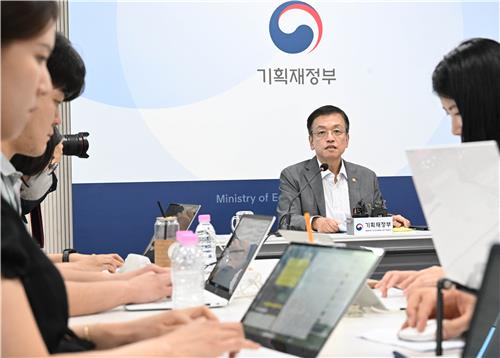- California Assembly OKs highest minimum wage in nation
- S. Korea unveils first graphic cigarette warnings
- US joins with South Korea, Japan in bid to deter North Korea
- LPGA golfer Chun In-gee finally back in action
- S. Korea won’t be top seed in final World Cup qualification round
- US men’s soccer misses 2nd straight Olympics
- US back on track in qualifying with 4-0 win over Guatemala
- High-intensity workout injuries spawn cottage industry
- CDC expands range of Zika mosquitoes into parts of Northeast
- Who knew? ‘The Walking Dead’ is helping families connect
Finance minister calls for scrapping financial investment income tax
Finance Minister Choi Sang-mok has said the government needs to scrap a financial investment income tax and review various tax schemes regarding stock trading in an effort to ease market uncertainty and help boost the stock market.
Under the investment income tax scheme, set to take effect next year, capital gains of over 50 million won (US$38,000) from stock investments will be subject to a 20 percent tax, while earnings exceeding 300 million won will be subject to a 25 percent tax.
“The scheme has increased market instability and made investors confused. It’s doubtful if any potential partial revision would help erase such uncertainties,” Choi said during a meeting with reporters Monday.
“I believe that it is needed to review many tax schemes regarding the stock market from scratch, while not implementing the investment tax,” he said, noting taxation regarding the financial market should consider potential impacts on assets transfer and broader economic circumstances, rather than focusing on taxation equity.
President Yoon Suk Yeol has pledged to abolish the tax, stressing that lifting capital market regulations is needed to erase the “Korea discount,” where South Korean companies have lower valuations than their global peers.
The ruling People Power Party voices supports for the abolition, while the main opposition Democratic Party, which holds a controlling majority in the National Assembly, is divided over the envisioned scheme.
Critics say scrapping the scheme will be another tax cut for the rich despite falling tax revenue and a fiscal deficit.

During the meeting, Choi said the government plans to submit the revision of the inheritance taxation system to the National Assembly in around the first half of next year, which calls for scrapping the current estate tax model.
The state tax is charged against all assets of a decedent before they are distributed, but the inheritance taxation model the government seeks to adopt will be based on the inheritance value that a beneficiary gets.
The Yoon government is also pushing to remove the highest tax rate of 50 percent, which is levied on inheritance exceeding 3 billion won, and apply a rate of 40 percent to any inheritance exceeding 1 billion won.
Speaking of the economy, the minister said domestic demand remains weak despite strong exports.
“Though we’ve come out of an economic crisis, we are still suffering from the impact of high interest rates and high prices,” he said, pointing to falling household income as another major factor.
But prices have been stabilized and real income made an upturn in the second quarter, so things are “expected to be better” in the third quarter if corporate profits improve further, Choi added.












